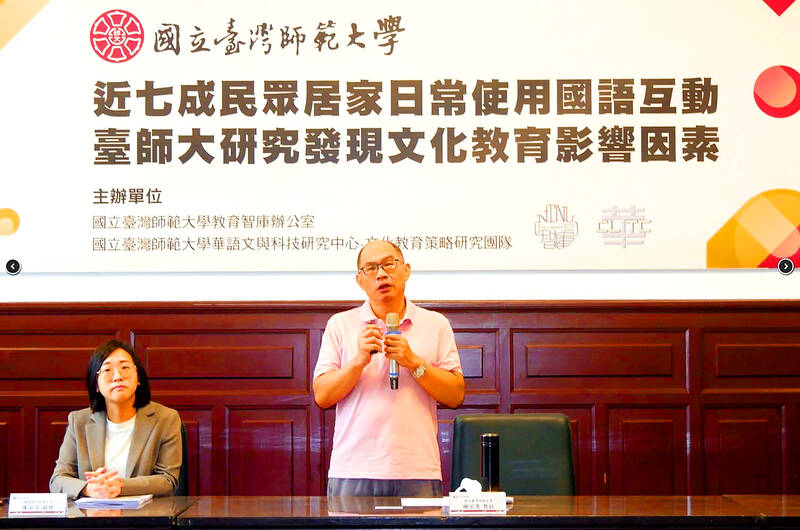The number of speakers of local languages is declining, a survey released earlier this month showed.
There is a trend of not speaking local languages at home such as Hoklo (commonly known as Taiwanese), Hakka and indigenous languages, National Taiwan Normal University linguistics professor Chung Chung-hsien (鍾宗憲) said, adding that the government should encourage families to speak these languages at home.
According to a survey by the university, 73.2 percent of Taiwanese identify themselves as Hoklo, followed by 11.2 percent Hakka.

Photo: Screen grab from Taiwan Normal University’s Web site
“However, the survey shows that 68.6 percent of Taiwanese speak Mandarin Chinese at home, while only 29.7 percent speak Hoklo and 1.4 speak Hakka in their homes,” he said.
“Going southward from Changhua and Nantou counties, the use of local languages increases while fewer people than in the north speak Mandarin, with the exception of more Mandarin use in Kaohsiung, as it is a major urban area,” he said.
The rate of speaking local languages is higher in older age groups, with people aged 55 to 59 having a higher rate of speaking a local language than Mandarin, he said.
The survey, conducted through telephone calls, collected 1,070 effective response samples and had a margin of error of 3 percentage points, Chung said.
In another survey conducted last year, 50 percent of people said they were not aware of their ethnic culture, he said.
Respondents said they recognize their ethnic culture through audiovisual media and music, with 60 percent and 52.1 percent respectively.
More than 90 percent said that trips to cultural and historical sites are extremely helpful in terms of cultural awareness, Chung said.
It is important to have fun while learning a language, he said, adding that the government should encourage education through content such as online games, illustrated books and manga.
Such an approach could also produce economic value through the export of cultural products, he said.
“Language learning should include the living environment, and it should not just be a process of going through textbooks. Social environment at school and the society has a role, but speaking one’s mother tongue at home is a guiding force,” he said.

Taiwan is to commence mass production of the Tien Kung (天弓, “Sky Bow”) III, IV and V missiles by the second quarter of this year if the legislature approves the government’s NT$1.25 trillion (US$39.78 billion) special defense budget, an official said yesterday. Commenting on condition of anonymity, a defense official with knowledge of the matter said that the advanced systems are expected to provide crucial capabilities against ballistic and cruise missiles for the proposed “T-Dome,” an advanced, multi-layered air defense network. The Tien Kung III is an air defense missile with a maximum interception altitude of 35km. The Tien Kung IV and V

The disruption of 941 flights in and out of Taiwan due to China’s large-scale military exercises was no accident, but rather the result of a “quasi-blockade” used to simulate creating the air and sea routes needed for an amphibious landing, a military expert said. The disruptions occurred on Tuesday and lasted about 10 hours as China conducted live-fire drills in the Taiwan Strait. The Civil Aviation Administration (CAA) said the exercises affected 857 international flights and 84 domestic flights, affecting more than 100,000 travelers. Su Tzu-yun (蘇紫雲), a research fellow at the government-sponsored Institute for National Defense and Security Research, said the air

Taiwan lacks effective and cost-efficient armaments to intercept rockets, making the planned “T-Dome” interception system necessary, two experts said on Tuesday. The concerns were raised after China’s military fired two waves of rockets during live-fire drills around Taiwan on Tuesday, part of two-day exercises code-named “Justice Mission 2025.” The first wave involved 17 rockets launched at 9am from Pingtan in China’s Fujian Province, according to Lieutenant General Hsieh Jih-sheng (謝日升) of the Office of the Deputy Chief of the General Staff for Intelligence at the Ministry of National Defense. Those rockets landed 70 nautical miles (129.6km) northeast of Keelung without flying over Taiwan,

A strong continental cold air mass is to bring pollutants to Taiwan from tomorrow, the Ministry of Environment said today, as it issued an “orange” air quality alert for most of the country. All of Taiwan except for Hualien and Taitung counties is to be under an “orange” air quality alert tomorrow, indicating air quality that is unhealthy for sensitive groups. In China, areas from Shandong to Shanghai have been enveloped in haze since Saturday, the ministry said in a news release. Yesterday, hourly concentrations of PM2.5 in these areas ranged from 65 to 160 micrograms per cubic meter (mg/m³), and pollutants were